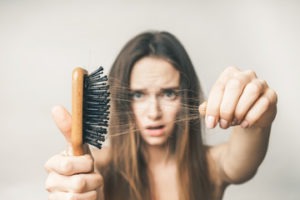
Losing their hair is one of women’s worst nightmares and yet it might surprise you to know that hair loss, otherwise known as alopecia, can affect up to 20% of women at some stage in their life with 13% of women in their 30s being affected.
For some, the hair loss may be sudden and obvious. It may also just be temporary and occur just a few months following childbirth or periods of stress. For others however, the loss will be slow and insidious and may not be noticeable until they’ve lost 50% of their hair. Alopecia can be classed as alopecia areata which affects patches or specific areas of the scalp, or totalis which is complete hair loss.
Causes of Hair Loss
Whilst the impact alopecia can have on self-confidence is obvious, it may also be an external sign that something else is going on inside and the sooner it is investigated and addressed, the better. When investigating the cause, it is important to track back 6 months at least to identify possible triggers.
Some causes of alopecia include:
Hormonal Imbalances
This could be caused by excess testosterone in women or a high conversion of testosterone to dihydrotestosterone (a stronger type of testosterone which has a greater effect on hair follicles) in men and women. This type of hair loss is most commonly found in women suffering from Polycystic Ovarian Syndrome (PCOS) and will often be accompanied by other symptoms of high testosterone such as acne, growth of facial or body hair along with changes in menstrual cycle and weight gain.
There is mixed evidence for the role of oestrogen in hair loss. Low oestrogen (especially after childbirth or in menopause) may be associated with hair loss in some women.
Hormonal Contraception
Female hair loss is also often the direct result of hormonal contraception. The worst offenders are the injection, implant, Nuvaring and birth control pills such as Triphasil. These contain progestins (a synthetic progesterone) that are highly androgenic (testosterone-like) and can decrease the size of hair follicles. Hair loss from androgenic progestins may take months (sometimes even years) to become noticeable and even longer to reverse.
Autoimmune disease
Alopecia areata frequently occurs in association with other autoimmune diseases such as thyroid disorders, anaemias and other skin disorders with an underlying autoimmune component. It is caused by an abnormality in the immune system that can damage hair follicles and disrupt normal hair formation.
Thyroid disease
Thyroid hormones directly affect hair growth. Clinical or sub-clinical hypothyroidism is often found in patients suffering from hair loss. The most common cause of hypothyroidism in developed countries is an autoimmune condition called Hashimoto’s thyroiditis where the thyroid gland is inflamed caused by the body’s own immune cells attacking itself. In such cases, both low thyroid function and the autoimmune antibodies against the thyroid contribute to the hair loss.
Nutrient deficiencies
When it comes to hair loss, diet is one of the most important factors. Not only can a poor diet lead to leaky gut and trigger autoimmune diseases, it can also result in nutrient deficiencies. Low iron, zinc, protein, folate, vitamin D and vitamin B12 have all been associated with alopecia.
Stress
Stress is a common cause of hair loss. Stress could be in the form of trauma, illness, undereating or some other form of physical stress. It creates inflammation and according to a research, sufferers of androgenic alopecia have higher markers of inflammation.
Scalp Infections
Certain infections on the scalp can also cause hair to fall out. Common infections include ringworm, Trichomycosis nodularis and folliculitis (inflammation of the follicles).
The Naturopathic Approach to Treating Hair Loss
In the same way as treating any other condition, the best way to resolve this problem is to identify the underlying cause that’s driving the hair loss. Rather than simply buying a hair supplement, it is best to investigate through case taking and pathology tests any underlying hormonal, inflammatory, autoimmune, nutritional, infective and stress-related drivers. Depending on the results, a treatment plan will then be tailored to address the specific drivers.
Some things you can do in the meantime include:
- Avoid inflammatory foods such as deep-fried foods and foods with refined sugar and eat anti-inflammatory foods such as fruits and vegetables.
- Maintain healthy intestinal bacteria because they also work to reduce inflammation. Eat plenty of plant foods to feed bacteria, and also avoid antibiotics as much as possible.
- Ensure adequate intake of iron and zinc-rich foods including green leafy vegetables, legumes, nuts and seeds
- Ensure you’re getting plenty of rest and relaxation
- Learn to manage your stress effectively
- Get some sunshine
- Reduce the use of chemicals on the scalp and hair
Katie Kuivisto